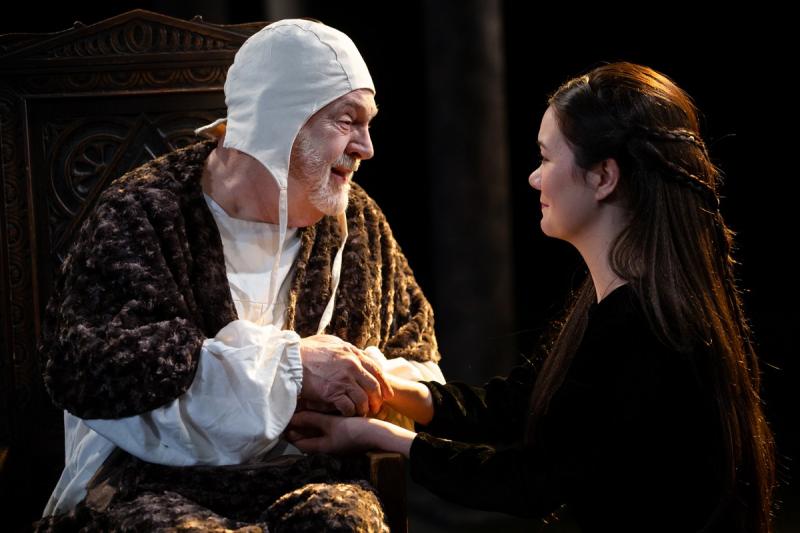Review: ALL'S WELL THAT ENDS WELL at Seattle Shakespeare ticks all the boxes.

Green as Helena in ALL'S WELL THAT ENDS
WELL at Seattle Shakespeare
With all the focus dedicated to the language and story, Seattle Shakespeare breaths new life into this old classic while maintaining all its traditions. While current trends rely on new interpretations, new locations, different time periods, this production stays true to the Bard and delivers the goods. ALL'S WELL THAT ENDS WELL is a bittersweet tale of love, war, and relationships. The show questions why we love who we love and who is deserving of love, romantic and familial.
Set in Medieval times, ALL'S WELL THAT ENDS WELL is a story that revolves around Bertram and Helena. Bertram is the son of Countess Rossillion and is in Paris serving the King of France who is gravely ill. Helena is the daughter of a recently deceased, famous physician. She has been adopted by the Countess and fallen in love with Bertram. She travels to Paris not only to seek Bertram but with an idea of how to cure the king. When her remedy works, the king bestows upon her a dowry and her choice of husband. She choses Bertram who immediately lists no less than two dozen reasons he doesn't want to marry her. He marries her in order to avoid the kind's wrath, but immediately leaves for the Florentine wars to escape his new wife. Again Helena follows Bertram to Florence where she learns that he is attempting to seduce a young woman named Diana. She meets with Diana and presents a plan that will bring Bertram unknowingly to her bed and fulfill the requirements he set for accepting her as his wife.
Keiko Green as Helena is heart-breakingly vulnerable and immensely brave. She is a rare example from this era of a woman with few options that is able to carve out the future she desires. Helena is a complicated character in that her actions are fueled by her love of a man that doesn't deserve her. I marvel not at the great lengths that Helena goes to win her husband's love but rather that she would still want him after the way he has treated her and Diana. Conner Brady Neddersen as Bertram has the unenviable task of playing a cad who remains desirable. He was especially successful with the "cad" part, but seen with modern eyes, he can be nothing more than a self-serving weasle. George Mount as Parolles and Keith Dahlgren as the Clown provided much needed levity to the show. Dahglren's witty banter and word play was sharp and on point. Suzanne Bouchard as the Countess gave a stalwart performance of strength and morality. By far, the night belonged to Michael Winters as the King of France who displayed an uncommon comfort with the words and cadence. His timing of pauses and inflections made the language as approachable and understandable as any Shakespearean show I have scene. The audience could relax during his scenes and not have to work quite so hard. R. Hamilton Wright (Lafew), Ayo Tushinde (Diana), Benjamin McFadden (Dumaine the Elder) and Christpher Morson (Dumaine the Younger) also gave strong performances..
The set design by Carol Wolfe Clay was simple and classic. A series of gothic arches, a portico, and two stone benches provided areas for intimate scenes as well as for movement and transitions between locations. Costumes by K.D. Schill were traditional and used to help distinguish those of rank and class. Lighting design by Andrew D. Smith helped designate distinctive areas on the stage. The use of bright down lighting helped to shape the tone and significance of several scenes and moments of illumination for the characters themselves.
Under the direction of Victor Pappas, the show has brisk pacing and tight transitions. The movements on stage are balanced and necessary with a few surprises but nothing gratuitous. Seattle Shakespeare provides a solid, well-rounded production of a Shakespearean classic. They tick all the boxes of what you want in a Shakespearean show.
ALL'S WELL THAT ENDS WELL is presented by Seattle Shakespeare Company at Center Theatre now through February 3rd. For tickets for more information, visit www.seattleshakespeare.org.
Add Your Comment
Videos
